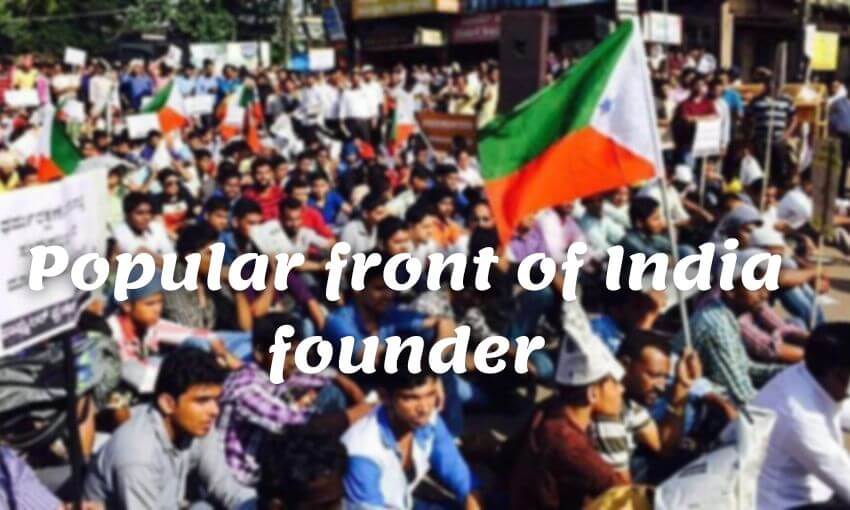Read more about the founder of PFI. The Popular Front of India (PFI) is a socio-political organization founded in 2006 by a group of Muslim intellectuals and activists in India. The organization finds with the aim of promoting social justice, communal harmony, and secularism in India. The PFI has been active in various social and political issues. Including the protection of minority rights, the fight against communalism, and the promotion of gender equality.

Firstly, the organization has also been involved in campaigns against corruption. And for the rights of Dalits and other marginalized communities. The founder of the PFI is E. Abubacker, a prominent Muslim leader and social activist from Kerala. Abubacker has been a vocal advocate for the rights of minorities. And has been involved in various social and political movements in India. He has also been a strong advocate for the rights of women. And has been involved in campaigns against gender-based violence.
The Significance of S.A. Dange’s Contributions to the Popular Front of India
Moreover, S.A. Dange was a prominent figure in the Indian independence movement and a key leader of the Popular Front of India (PFI). His contributions to the PFI were immense and had a lasting impact on the organization and its goals.
Dange was born in 1885 in Maharashtra and was educated at Elphinstone College in Bombay. And also, was a member of the Indian National Congress and was a strong advocate of socialism. Also, was a leader of the All India Trade Union Congress. And was instrumental in the formation of the Communist Party of India in 1925.
A major proponent of the Popular Front of India: Driving force behind
Furthermore, Dange was a major proponent of the Popular Front of India, which was formed in 1936. He was a key figure in the organization and was responsible for its growth and development. He was a strong advocate of the PFI’s goals of social justice. Economic equality, and political freedom. He was also a major proponent of the PFI’s policy of non-violence and peaceful protest.
Also, Dange was a major influence on the PFI’s ideology and strategy. He was a strong advocate of the organization’s commitment to non-violence and peaceful protest. He also advocated for the PFI’s commitment to social justice and economic equality. He was a major proponent of the PFI’s policy of cooperation with other political parties and organizations.
Dange’s contributions to the PFI: Founder of PFI
Next, Dange’s contributions to the PFI were immense and had a lasting impact on the organization and its goals. He was a major influence on the organization’s ideology and strategy. And was a strong advocate of its commitment to social justice and economic equality. His commitment to non-violence and peaceful protest was also a major influence on the PFI’s policy. His contributions to the PFI were instrumental in its growth and development. And helped to shape the organization into the powerful force it is today.
Examining the Impact of S.A. Dange’s Leadership on the Popular Front of India
Moreover, S.A. Dange was a prominent leader of the Popular Front of India (PFI). And a major figure in the Indian independence movement. His leadership had a profound impact on the PFI and its goals. In this essay, we will analyze the impact of Dange’s leadership on the PFI and its legacy.
Dange was a passionate advocate for the rights of the working class and the poor. He was a strong believer in the power of collective action and organized labor. He was also a staunch opponent of imperialism and colonialism. His leadership helped to shape the PFI’s mission and goals. Which were to fight for the rights of the working class. And the poor and to oppose imperialism and colonialism.
A major proponent of non-violence and peaceful protest:
Subsequently, Dange was also a major proponent of non-violence and peaceful protest. He believed that peaceful protest was the most effective way to achieve social change. He was a strong advocate for civil disobedience and peaceful resistance. His leadership helped to shape the PFI’s approach to social change. Which was to use peaceful protest and civil disobedience to achieve its goals.
Dange was also a major proponent of education and literacy. He believed that education was the key to social progress and economic development. He was a strong advocate for universal education and literacy. His leadership helped to shape the PFI’s approach to education. Which was to promote universal education and literacy.
A proponent of democracy and freedom of speech: Founder of PFI
Also, Dange was a major proponent of democracy and freedom of speech. He believed that democracy was the best form of government. And that freedom of speech was essential for a healthy democracy. His leadership helped to shape the PFI’s approach to democracy. Which was to promote democracy and freedom of speech.
Besides, S.A. Dange’s leadership had a profound impact on the Popular Front of India and its legacy. His leadership helped to shape the PFI’s mission and goals. It’s an approach to social change, an approach to education, and its approach to democracy. His leadership was instrumental in shaping the PFI’s legacy as a major force for social change in India. Dange was a key figure in the formation of the Popular Front of India (PFI). He was a prominent leader of the Communist Party of India (CPI). And was instrumental in the formation of the PFI in 1936.
Apart from this, Dange was a strong advocate of the idea of a united front of all progressive forces in India. He believed that the only way to achieve the goal of Indian independence. That was through a united front of all progressive forces. He argued that the only way to achieve this was through a broad-based popular front. That would bring together all the different sections of the Indian people.
Dange strong advocate:
Furthermore, Dange was also a strong advocate of the idea of a united front of all progressive forces in India. He argued that the only way to achieve the goal of Indian independence was through a united
Exploring the Ideology of the Popular Front of India and Its Founder S.A. Dange
Also, the Popular Front of India (PFI) is a political organization founded in 2006 by S.A. Dange, a veteran Indian communist leader. The PFI is a left-wing organization that seeks to promote social justice and secularism in India. It has been involved in a number of social and political activities, including protests against the government’s policies. Campaigns for the rights of marginalized communities, and the promotion of progressive values.
The ideology of the PFI:
In addition, the ideology of the PFI is rooted in the Marxist-Leninist tradition. It is committed to the establishment of a socialist society in India. And it seeks to achieve this through the mobilization of the working class. And other marginalized sections of society. The PFI also advocates for the protection of civil liberties and the promotion of secularism.
Also, the founder of the PFI, S.A. Dange, was a prominent figure in the Indian communist movement. He was a leader of the Communist Party of India (CPI). And was a member of the Central Committee of the CPI from 1934 to 1964. He was also a member of the Politburo of the CPI from 1952 to 1964.
Besides, Dange was a strong advocate of the Marxist-Leninist ideology. And as a vocal critic of the Soviet Union’s policies. He was also a proponent of the idea of a united India. And he was a strong advocate of the rights of the working class. And other marginalized sections of society.
Involvation of PFI: Founder of PFI
Furthermore, the PFI has been involved in a number of social and political activities. Including protests against the government’s policies, and campaigns for the rights of marginalized communities. And the promotion of progressive values. It has also been involved in the promotion of education and health care for the poor and marginalized sections of society.
Also, the PFI has been criticized by some for its alleged links to extremist groups. But the organization has denied these allegations. The PFI has also been accused of promoting religious intolerance. But the organization has denied these allegations as well.
Overall, the ideology of the PFI is rooted in the Marxist-Leninist tradition. And seeks to promote social justice and secularism in India. The organization has been involved in a number of social and political activities. And it has been accused of promoting religious intolerance. But the organization has denied these allegations. The founder of the PFI, S.A. Dange. He is a prominent figure in the Indian communist movement. Also, is a strong advocate of the Marxist-Leninist ideology.
The Life and Legacy of S.A. Dange: The Founder of the Popular Front of India
Along with this, S.A. Dange was a revolutionary figure in Indian politics and a leader of the Indian working class. He was the founder of the Popular Front of India (PFI). A left-wing political organization that has been active in India since the early 20th century. Dange was a tireless advocate for the rights of the working class. And a staunch opponent of imperialism and colonialism. He was a major figure in the Indian independence movement. And a key figure in the formation of the Indian National Congress.
About Dange’s life:
Moreover, Dange was born in 1885 in the small village of Dharwad in the state of Karnataka. He was the son of a poor farmer and was educated in the local school. He was an avid reader and was deeply influenced by the works of Karl Marx and Friedrich Engels. He joined the Indian National Congress in 1906 and quickly rose to prominence in the party. He was a strong advocate for the rights of the working class and was a vocal critic of the British Raj.
Particularly, In the 1920s, Dange was a leader of the trade union movement in India. He was a major figure in the formation of the All India Trade Union Congress (AITUC). And was instrumental in the formation of the Communist Party of India (CPI). He was a major figure in the Indian independence movement and was a key figure in the formation of the Indian National Congress.
In the 1930s, Dange founded the Popular Front of India (PFI). The PFI was a left-wing political organization. That sought to unite the working class and fight for their rights. The PFI was a major force in the Indian independence movement. And was instrumental in the formation of the Indian National Congress.
Indian independence movement: Founder of PFI
Also, Dange was a major figure in the Indian independence movement. And a key figure in the formation of the Indian National Congress. He was a tireless advocate for the rights of the working class. And a staunch opponent of imperialism and colonialism. He was a major figure in the Indian independence movement. And a key figure in the formation of the Indian National Congress.
Besides, Dange’s legacy is one of dedication to the cause of the working class and the struggle for Indian independence. He was a major figure in the Indian independence movement. And a key figure in the formation of the Indian National Congress. His legacy is one of dedication to the cause of the working class and the struggle for Indian independence. He was a major figure in the Indian independence movement. And a key figure in the formation of the Indian National Congress. His legacy is one of dedication to the cause of the working class and the struggle for Indian independence.
Conclusion
To sum up, the Popular Front of India was founded in 2006 by a group of Muslim intellectuals. And activists who sought to create a platform for the Muslim community to fight for their rights. And to promote social justice and equality. The organization has since grown to become one of the largest Muslim organizations in India. With a presence in over 20 states. The Popular Front of India has been instrumental in advocating for the rights of the Muslim community. And has been a strong voice for social justice and equality.
The organization involves in various campaigns to promote communal harmony and fight against discrimination and injustice. The Popular Front of India is a powerful force for positive change in India and its founder. E. Abubacker, should be commended for his tireless efforts to promote social justice and equality.
Content from other States:
- No items




